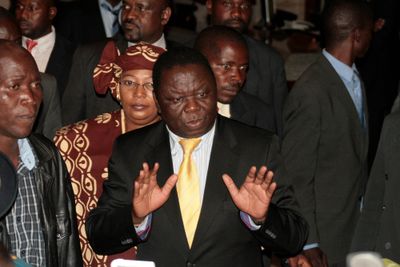Rival factions in Zimbabwe agree to split government powers

JOHANNESBURG, South Africa – Bitter rivals reached a power-sharing deal Thursday that leaves Robert Mugabe president of Zimbabwe and in control of its armed forces but gives his opponents hopes for enough power to rescue the shattered country.
The complicated agreement makes Mugabe’s rival, Morgan Tsvangirai of the Movement for Democratic Change, prime minister and creates a government whose ministers meet twice in parallel structures – once with the prime minister in charge and once under the president.
Details of how the government would resolve conflicts were not clear late Thursday. Some diplomats and observers were skeptical the opposition could wrest power from Mugabe.
With official figures showing hyperinflation running in the millions of percent, industry and agriculture in a state of collapse and the country facing severe food shortages, it is unclear whether Western powers will back the deal and offer a financial rescue package if Mugabe retains control of the military.
The deal comes after weeks of talks following Tsvangirai’s withdrawal from a presidential runoff election on June 27 because of violence against MDC activists.
Mugabe, 84, who has ruled the country since its independence in 1980, was inaugurated despite condemnation of the vote as undemocratic by Western and African observers. During the election campaign, Mugabe said Tsvangirai and the MDC would never be allowed to rule the country.
An opposition source said the proposal to have a council of ministers as well as a Cabinet broke a stalemate on who would have executive control.
“It’s the same group of people, which means they are actually making recommendations to themselves,” he said.
Sources close to the ruling ZANU-PF party said the deal would give Mugabe final control on government decisions. But the opposition believes that real power would be vested in the Council of Ministers headed by Tsvangirai, and that meeting again under Mugabe, they would rubber-stamp their previous decisions.